‘Too little, too indecisive’: Ukraine support in peril as Europe’s politics turn
'People want this war to be over, and now you have movements and parties that actually promise that the war will be over,' says geostrategist Velina Tchakarova
 Ukrainian soldiers of 43rd Brigade are seen working on a Soviet era Pion self propelled howitzer in the direction of Chasiv Yar, Ukraine on January 27, 2025.
Ukrainian soldiers of 43rd Brigade are seen working on a Soviet era Pion self propelled howitzer in the direction of Chasiv Yar, Ukraine on January 27, 2025.
- 'Trump is going to act in accordance with the national interests of the United States. Ukraine is not a priority for this new administration,' Vienna-based Tchakarova tells Anadolu
ATHENS
The rise of populist parties and a shift from centrist to anti-system politics in Europe could make sustaining support for Ukraine more challenging in 2025, a Vienna-based expert has warned.
Velina Tchakarova, a geostrategist, highlighted how the prolonged war in Ukraine is fueling economic hardships across Europe, particularly through inflation driven by high energy costs. She argued that far-right and far-left parties — many of which lean pro-Russian — are capitalizing on public discontent by promising a swift resolution to the conflict.
“People want this war to be over, and now you have movements and parties that actually promise that the war will be over and consequently all the problems linked with it will end,” she said.
❝The longer the war continues, the bigger the inflationary impact on societies will be because of all the disruptions, in terms of commodity supply❞
— Anadolu English (@anadoluagency) February 6, 2025
❝Trump is going to act in accordance with the national interests of the United States. Ukraine is not a priority for this new… pic.twitter.com/LO1bAXt9KC
However, she attributed the war’s prolonged duration to Western policymakers, whom she accused of failing to act decisively.
“There was no sense of urgency right from the beginning. There was this approach that we will support Ukraine as long as it takes, but they didn’t stick with it,” Tchakarova said.
“They were not able to provide artillery ammunition to Ukraine when it was needed most. They were not able to convince the Global South to support their policies and sanctions on Russia. While Russia remains the most-sanctioned country in the world, Russian energy and petrochemicals continue to flow to Europe via Moscow’s proxies at inflated prices,” she explained.
She argued that this lack of resolve contributed to the war’s continuation. “This was the major cause for this prolongation of the war on behalf of the West. It was too little, too late, too indecisive,” she said
Trump’s return: A challenge for Europe
Tchakarova also warned that the return of Donald Trump to the White House poses a significant geopolitical challenge for European leaders
“Trump is going to act in accordance with the national interests of the United States. Ukraine is not a priority for this new administration. The Middle East is a priority, and the South China Sea, the Indo-Pacific, is the long-term, systemic priority,” she commented
She predicted that Washington would likely push for at least a temporary ceasefire between Ukraine and Russia this year
“And this is detrimental to some of the goals of the European approach, because obviously Ukraine will be pressured to make concessions. Subsequently, it will be very difficult for European leaders to explain this to their own population — why they had to, and (why), once Trump comes to power, he immediately manages to actually come up with a ceasefire in the war,” she said
Despite concerns that Trump might cut aid to Ukraine, Tchakarova believes he will instead push Kyiv to buy more American weapons in line with his policies
“Instead, he will push Ukraine to purchase more US weapons in line with his policies and promises. That means the EU’s dependence on the US will deepen, which will come on top of growing economic pressure, social and political problems, and division within the union.”
Anadolu Agency website contains only a portion of the news stories offered to subscribers in the AA News Broadcasting System (HAS), and in summarized form. Please contact us for subscription options.







